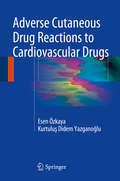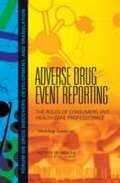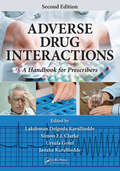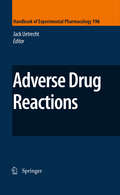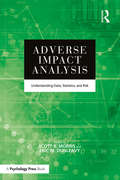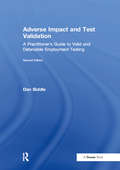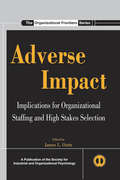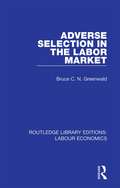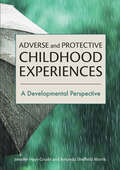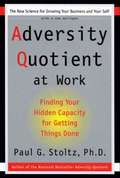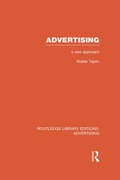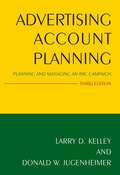- Table View
- List View
Adverse Childhood Experiences: What Students and Health Professionals Need to Know
by Roberta Waite Ruth Ann RyanThis guide provides healthcare students and professionals with a foundational background on adverse childhood experiences (ACEs) – traumatic early life experiences, which can have a profound impact on health in later life. ACEs can include being a victim of abuse, neglect or exposure to risk in the home or community. How healthcare students and professionals learn to recognize, react and respond to persons affected by trauma will lay the foundation for their relationships with patients. This book intentionally uses micro-to-macro lenses accompanied by a structural competency framework to elucidate health implications across the lifespan. It explores the nature of adversity and its effects on the physical, emotional, cognitive and social health of individuals, communities and society. The book, written by two experienced psychiatric nurses, will equip healthcare students and professionals with an understanding for critical change in practice and offer action steps designed to assist them with prevention and intervention approaches and steps to help build resilience. This book will be core reading for healthcare students within mental health, pediatric and primary care nursing courses. It will also be of interest to students and professionals in the social work, psychology and public health fields who are exploring resilience and trauma-informed practices
Adverse Cutaneous Drug Reactions to Cardiovascular Drugs
by Esen Özkaya Kurtuluş Didem YazganoğluAdverse cutaneous drug reactions (ACDR) are among the most frequent events in patients receiving drug therapy. Cardiovascular (CV) drugs are an important group of drugs with potential risk of developing ACDR especially in elderly as marketing of more new drugs and their prescription continue to increase. However, like with most other drugs the exact incidence of cutaneous side effects from CV drugs is difficult to estimate due to sporadic reporting. Moreover, a reliable designation of a certain drug as the cause of a certain type of reaction can rarely be made. Apart from the well-known angioedema/urticaria from ACE inhibitors, lichen planus / lichenoid reaction from beta adrenergic blockers and photosensitivity from thiazid diuretics, ACDR from CV drugs might be seen in a wide spectrum extending to rare but life-threatening conditions such as erythroderma, Stevens-Johnson syndrome, toxic epidermal necrolysis or drug hypersensitivity syndrome. In this comprehensive review, the reported types of ACDR to CV drugs will be discussed according to drug class and the type of dermatologic reaction with special emphasize on cross-reactions and the role of patch testing in diagnosis.
Adverse Drug Event Reporting: The Roles Of Consumers And Health-care Professionals
by Institute of Medicine of the National AcademiesThe National Academies Press (NAP)--publisher for the National Academies--publishes more than 200 books a year offering the most authoritative views, definitive information, and groundbreaking recommendations on a wide range of topics in science, engineering, and health. Our books are unique in that they are authored by the nation's leading experts in every scientific field.
Adverse Drug Interactions: A Handbook for Prescribers, Second Edition
by Simon Clarke Ursula Gotel nee Collignon Janaka Karalliedde Lakshman KarallieddeAdverse Drug Interactions: A Handbook for Prescribers assists clinicians by providing key information on potential adverse effects that can result from prescribing two or more drugs for simultaneous use. Interactions that are likely to give rise to life-threatening conditions, and which must therefore be completely avoided, are clearly highlighted.
Adverse Drug Reactions (Handbook of Experimental Pharmacology #196)
by Jack UetrechtThis book provides the current state of knowledge of basic mechanisms of adverse drug reactions (ADRs). The main focus is on idiosyncratic drug reactions because they are the most difficult to deal with. It starts with a general description of the major targets for ADRs followed by a description of what are presently believed to be mediators and biochemical pathways involved in idiosyncratic drug reactions. There is also a description of several examples of ADRs that serve to illustrate specific aspects of ADR mechanisms. Eventually the book shows that ultimately better methods are needed to predict which drug candidates are likely to cause ADRs and which patients are at increased risk. But at present research seems to be far from this goal.
Adverse Effects (Saving Caeorleia #2)
by Alicia NordwellSaving Caeorleia: Book TwoDade, human-Caeorleian hybrid and ex-military grunt, doesn't fit in--not with humans, not with aliens, not anywhere. He's always on the outskirts, angry, and people aren't sure they can trust him. When he encounters a compatible tziu named Yaseke, secrets, misunderstandings, and attacks nearly prevent the two from making a connection Dade sorely needs. Even after they unite, Dade and Yaseke face challenges that two newly joined males should never have to endure. From traitorous council members, to sadistic aliens who plan to sell them as slaves, to meeting a mysterious race of revered aliens called Collectors, Dade and Yaseke manage to stay together--and even rescue two youths related to Yaseke, who've lost their parents to the same betrayer. Someone from Dade's past is at the root of everything he's suffered. No way can he let them get away with what they're planning, but Dade isn't sure he can stop them on his own. If he doesn't let go of his isolation and risk the pain letting others in will bring, he'll never save Caeorleia in time.
Adverse Effects of Vaccines
by Committee to Review Adverse Effects of VaccinesIn 1900, for every 1,000 babies born in the United States, 100 would die before their first birthday, often due to infectious diseases. Today, vaccines exist for many viral and bacterial diseases. The National Childhood Vaccine Injury Act, passed in 1986, was intended to bolster vaccine research and development through the federal coordination of vaccine initiatives and to provide relief to vaccine manufacturers facing financial burdens. The legislation also intended to address concerns about the safety of vaccines by instituting a compensation program, setting up a passive surveillance system for vaccine adverse events, and by providing information to consumers. A key component of the legislation required the U. S. Department of Health and Human Services to collaborate with the Institute of Medicine to assess concerns about the safety of vaccines and potential adverse events, especially in children. Adverse Effects of Vaccines reviews the epidemiological, clinical, and biological evidence regarding adverse health events associated with specific vaccines covered by the National Vaccine Injury Compensation Program (VICP), including the varicella zoster vaccine, influenza vaccines, the hepatitis B vaccine, and the human papillomavirus vaccine, among others. For each possible adverse event, the report reviews peer-reviewed primary studies, summarizes their findings, and evaluates the epidemiological, clinical, and biological evidence. It finds that while no vaccine is 100 percent safe, very few adverse events are shown to be caused by vaccines. In addition, the evidence shows that vaccines do not cause several conditions. For example, the MMR vaccine is not associated with autism or childhood diabetes. Also, the DTaP vaccine is not associated with diabetes and the influenza vaccine given as a shot does not exacerbate asthma. Adverse Effects of Vaccines will be of special interest to the National Vaccine Program Office, the VICP, the Centers for Disease Control and Prevention, vaccine safety researchers and manufacturers, parents, caregivers, and health professionals in the private and public sectors.
Adverse Events with Biomedicines: Prevention Through Understanding
by Giuseppe TridenteThis monograph gathers and evaluates data on adverse events (AEs) associated specifically with those "biomedicines" - monoclonal antibodies, fusion proteins, and cytokines - that have recently entered therapeutic use in humans. All AEs observed when using each member of this new drug class are covered, with a view to improving understanding of pathogenesis, facilitating prevention, monitoring, and control, and contributing to the development of better drugs that provide benefits while minimizing risk. Further aspects here examined include the role of drug mechanisms of action and immunogenicity in relation to AEs outcome and induction of systemic syndromes. Additional data on AEs in off-label treatments are also considered. Electronic data sheets, downloadable from Springer Extra Materials platform, include more detailed safety data as well as additional basic information on product characteristics, pre- and post-marketing AEs classified according to frequency, and system/organ targeting. Data on excipients and selected information on drug interactions and associations are also provided. Adverse Events with Biomedicines: Prevention Through Understanding will serve as a detailed, practical guideline to this important new area, which demands the attention of clinicians, immunologists, oncologists, allergologists, public health professionals, and drug companies.
Adverse Events: Race, Inequality, and the Testing of New Pharmaceuticals (Anthropologies of American Medicine: Culture, Power, and Practice #9)
by Jill A. FisherWinner, 2022 Donald W. Light Award for Applied Medical Sociology, given by the Medical Sociology Section of the American Sociological AssociationWinner, 2021 Robert K. Merton Book Award, given by the Science, Knowledge, and Technology Section of the American Sociological Association2021 Outstanding Academic Title, Choice MagazineExplores the social inequality of clinical drug testing and its effects on scientific resultsImagine that you volunteer for the clinical trial of an experimental drug. The only direct benefit of participating is that you will receive up to $5,175. You must spend twenty nights literally locked in a research facility. You will be told what to eat, when to eat, and when to sleep. You will share a bedroom with several strangers. Who are you, and why would you choose to take part in this kind of study? This book explores the hidden world of pharmaceutical testing on healthy volunteers. Drawing on two years of fieldwork in clinics across the country and 268 interviews with participants and staff, it illustrates how decisions to take part in such studies are often influenced by poverty and lack of employment opportunities. It shows that healthy participants are typically recruited from African American and Latino/a communities, and that they are often serial participants, who obtain a significant portion of their income from these trials. This book reveals not only how social inequality fundamentally shapes these drug trials, but it also depicts the important validity concerns inherent in this mode of testing new pharmaceuticals. These highly controlled studies bear little resemblance to real-world conditions, and everyone involved is incentivized to game the system, ultimately making new drugs appear safer than they really are. Adverse Events provides an unprecedented view of the intersection of racial inequalities with pharmaceutical testing, signaling the dangers of this research enterprise to both social justice and public health.
Adverse Events: Race, Inequality, and the Testing of New Pharmaceuticals (Anthropologies of American Medicine: Culture, Power, and Practice)
by Jill A. FisherExplores the social inequality of clinical drug testing and its effects on scientific resultsImagine that you volunteer for the clinical trial of an experimental drug. The only direct benefit of participating is that you will receive up to $5,175. You must spend twenty nights literally locked in a research facility. You will be told what to eat, when to eat, and when to sleep. You will share a bedroom with several strangers. Who are you, and why would you choose to take part in this kind of study? This book explores the hidden world of pharmaceutical testing on healthy volunteers. Drawing on two years of fieldwork in clinics across the country and 268 interviews with participants and staff, it illustrates how decisions to take part in such studies are often influenced by poverty and lack of employment opportunities. It shows that healthy participants are typically recruited from African American and Latino/a communities, and that they are often serial participants, who obtain a significant portion of their income from these trials. This book reveals not only how social inequality fundamentally shapes these drug trials, but it also depicts the important validity concerns inherent in this mode of testing new pharmaceuticals. These highly controlled studies bear little resemblance to real-world conditions, and everyone involved is incentivized to game the system, ultimately making new drugs appear safer than they really are. Adverse Events provides an unprecedented view of the intersection of racial inequalities with pharmaceutical testing, signaling the dangers of this research enterprise to both social justice and public health.
Adverse Impact Analysis: Understanding Data, Statistics, and Risk
by Scott B. Morris Eric M. DunleavyCompliance with federal equal employment opportunity regulations, including civil rights laws and affirmative action requirements, requires collection and analysis of data on disparities in employment outcomes, often referred to as adverse impact. While most human resources (HR) practitioners are familiar with basic adverse impact analysis, the courts and regulatory agencies are increasingly relying on more sophisticated methods to assess disparities. Employment data are often complicated, and can include a broad array of employment actions (e.g., selection, pay, promotion, termination), as well as data that span multiple protected groups, settings, and points in time. In the era of "big data," the HR analyst often has access to larger and more complex data sets relevant to employment disparities. Consequently, an informed HR practitioner needs a richer understanding of the issues and methods for conducting disparity analyses. This book brings together the diverse literature on disparity analysis, spanning work from statistics, industrial/organizational psychology, human resource management, labor economics, and law, to provide a comprehensive and integrated summary of current best practices in the field. Throughout, the description of methods is grounded in the legal context and current trends in employment litigation and the practices of federal regulatory agencies. The book provides guidance on all phases of disparity analysis, including: How to structure diverse and complex employment data for disparity analysis How to conduct both basic and advanced statistical analyses on employment outcomes related to employee selection, promotion, compensation, termination, and other employment outcomes How to interpret results in terms of both practical and statistical significance Common practical challenges and pitfalls in disparity analysis and strategies to deal with these issues
Adverse Impact Analysis: Understanding Data, Statistics, and Risk
by Scott B. Morris Eric M. DunleavyCompliance with federal equal employment opportunity regulations, including civil rights laws and affirmative action requirements, requires collection and analysis of data on disparities in employment outcomes, often referred to as adverse impact. While most human resources (HR) practitioners are familiar with basic adverse impact analysis, the courts and regulatory agencies are increasingly relying on more sophisticated methods to assess disparities. Employment data are often complicated, and can include a broad array of employment actions (e.g., selection, pay, promotion, termination), as well as data that span multiple protected groups, settings, and points in time. In the era of "big data," the HR analyst often has access to larger and more complex data sets relevant to employment disparities. Consequently, an informed HR practitioner needs a richer understanding of the issues and methods for conducting disparity analyses.This book brings together the diverse literature on disparity analysis, spanning work from statistics, industrial/organizational psychology, human resource management, labor economics, and law, to provide a comprehensive and integrated summary of current best practices in the field. Throughout, the description of methods is grounded in the legal context and current trends in employment litigation and the practices of federal regulatory agencies. The book provides guidance on all phases of disparity analysis, including: How to structure diverse and complex employment data for disparity analysis How to conduct both basic and advanced statistical analyses on employment outcomes related to employee selection, promotion, compensation, termination, and other employment outcomes How to interpret results in terms of both practical and statistical significance Common practical challenges and pitfalls in disparity analysis and strategies to deal with these issues
Adverse Impact and Test Validation: A Practitioner's Guide to Valid and Defensible Employment Testing
by Dan BiddleAdverse impact analyses and test validation promote social justice and equity. Employers who unknowingly use invalid tests or recruitment procedures that have an adverse impact are reducing minority and/or female representation in their workforce, unfairly screening out qualified workers and (worst of all) just plain discriminating. Dan Biddle's Adverse Impact and Test Validation provides you with analyses that allow you to identify which of your selection procedures have adverse impact. The validation steps will help you decide whether to keep the selection procedure (because it's valid), change it, or stop using it altogether. This second edition contains new material on using multiple regression to evaluate pay practices and provides step-by-step instructions for using SPSS or Excel for evaluating your company's pay practices for possible inequities. New content on how to define "Internet applicants" and set up defensible Basic Qualifications (BQs) for online recruiting will help employers ensure compliance with EEO regulations and screen in qualified applicants. Specific guidelines for developing and validating written job knowledge tests, such as those used for police and fire promotional testing, have also been included in this new edition. The CD included in the back cover of the book includes tools (which may be used on a trial evaluation basis) describing several of the functions described in the book, including Adverse Impact Toolkit®, Test Validation and Analysis Program® (TVAP®), Guidelines Oriented Job Analysis® (GOJA®) Manual, and Content Validity Checklists. This highly pragmatic guide goes beyond the concepts, theories and ideas behind adverse impact and test validation. It not only explains what to do but crucially, also shows you how to do it. The second edition has been expanded to include two brand new chapters with a new Appendix and comes with new editions of the accompanying software. As a means of protecting your organization from litigation, damage to employee relations and to your corporate reputation, Adverse Impact and Test Validation is a 'must-have' purchase for human resource professionals, testing and recruitment specialists.
Adverse Impact: Implications for Organizational Staffing and High Stakes Selection (SIOP Organizational Frontiers Series)
by James L. OuttzThis text is the best single repository for a comprehensive examination of the scientific research and practical issues associated with adverse impact. Adverse impact occurs when there is a significant difference in organizational outcomes to the disadvantage of one or more groups defined on the basis of demographic characteristics such as race, ethnicity, gender, age, religion, etc. This book shows, based on scientific research, how to design selection systems that minimize subgroup differences. The primary object of this volume in the SIOP series is to bring together renowned experts in this field to present their viewpoints and perspectives on what underlies adverse impact, where we are in terms of assessing it and what we may have learned (or not learned) about minimizing it.
Adverse Reproductive Outcomes in Families of Atomic Veterans: The Feasibility of Epidemiologic Studies
by National Research CouncilOver the past several decades, public concern over exposure to ionizing radiation has increased. This concern has manifested itself in different ways depending on the perception of risk to different individuals and different groups and the circumstances of their exposure. One such group are those U.S. servicemen (the "Atomic Veterans" who participated in the atmospheric testing of nuclear weapons at the Nevada Test Site or in the Pacific Proving Grounds, who served with occupation forces in or near Hiroshima and Nagasaki, or who were prisoners of war in or near those cities at the time of, or shortly after, the atomic bombings. This book addresses the feasibility of conducting an epidemiologic study to determine if there is an increased risk of adverse reproductive outcomes in the spouses, children, and grandchildren of the Atomic Veterans.
Adverse Selection in the Labor Market (Routledge Library Editions: Labour Economics #7)
by Bruce C. GreenwaldFirst published in 1979. This thesis describes the theoretical impact on labour markets of a process of adverse selection similar to that described in outline by George Arthur Akerlof. It concerns the information conveyed to potential employers by the fact that any new worker, except for one just entering the labour force, has either left or is prepared to leave his latest Job. If an employer is able to identify his good workers more accurately than the market at large and is generally successful in retaining them, then the group of workers leaving him will contain a disproportionately small number of good ones. For similar reasons this pool should also contain an unusually large number of bad workers who have been either flied or induced to quit. Thus, workers who change jobs should on average be less able ones. Since the market failures that result have potentially significant consequences in the labour market, this study is devoted to examining their influence on the structure of wages and job tenure, and on the operation and efficiency of labour markets. This title will be of great interest to students of economics and business studies.
Adverse and Protective Childhood Experiences: A Developmental Perspective
by Jennifer Hays-Grudo Amanda Sheffield Morris PhDAdverse childhood experiences (ACEs) can negatively influence development. However, the lifelong effects of positive childhood experiences (PACEs) can mitigate the detrimental effects of adverse ones. By integrating existing knowledge about (ACEs) with developmental research on preventing, buffering, and treating the effects of adversity, stress, and trauma on child development and subsequent health and functioning, this book identifies the most important of these (PACEs). It provides an interdisciplinary lens from which to view the multiple types of effects of enduring childhood experiences, and recommends evidence-based approaches for protecting children and repairing the enduring negative consequences of (ACEs) they face as adults. Students, researchers, clinicians, and health-care providers can use this research to understand the science of early life adversity, lifelong resilience, and related intervention and prevention programming to help those suffering from the lifelong effects of (ACEs). Chapters include many figures, graphs, diagrams, stories, and activities that aim to help readers apply the science to everyday life.
Adversity Quotient at Work: Finding Your Hidden Capacity for Getting Things Done
by Paul G. StoltzIn 1997, Paul Stoltz unleashed a revolution with his groundbreaking book Adversity Quotient: Turning Obstacles into Opportunities, introducing the concept of the Adversity Quotient into public consciousness. Now, in Adversity Quotient @ Work, Stoltz applies the principles of his brilliant theory to the uniquely challenging environment of the workplace.AQ is a measure of one's ability to handle adversity. Those who can't become easily overwhelmed and emotional, then pull back and stop trying; those who can handle adversity become the leaders of today and tomorrow. Adversity Quotient @ Work clearly demonstrates how workers and managers can use this concept of the AQ to their own advantage, and to the benefit of their clients and customers.Adversity Quotient @ Work teaches listeners how to hire and retain highly motivated and talented workers, develop employees to their full potential, and create a leadership culture that encourages all to put forth their best efforts and maximize their performance capabilities. Based on real research performed with thousands of managers and members of the workforce on the front lines of hundreds of businesses, it will quickly become any corporation's indispensable handbook for success.
Adversity for Sale: Ya Gotta Believe
by JeezyTo Jeezy&’s legion of fans, his name is synonymous with hustle, grit, and the integrity to go out there and achieve your dreams. In his first book, Adversity for Sale: Ya Gotta Believe, Jeezy shares never heard stories of what it took for him to beat the odds and get out of the streets, his mindset he carefully honed to get an edge, and the lessons that changed his life and business.Born into poverty and raised in a small town in the middle of South Georgia&’s so-called &“Black belt,&” Jeezy realized at an early age that nothing was going to come easy, there were no handouts headed his way, and if he ever wanted anything in life, he was going to have to get out there and get it on his own. So that&’s what he did. Now, for the first time, Jeezy retraces his steps, going back to day one to share how he turned nothing into something, stayed solid, survived the trap, and triumphed over adversity to become the successful artist, father, husband, entrepreneur, and philanthropist that he is today. Adversity for Sale isn&’t a street memoir. Like his music, these pages are filled with lessons from his deeply personal story to motivate you to go out and get after your dream.
Advertisements for Runaway Slaves in Virginia, 1801-1820 (Studies in African American History and Culture)
by Daniel MeadersFirst published in 1997. Routledge is an imprint of Taylor & Francis, an informa company.
Advertising
by Michael F. Weigold William F. ArensM: Advertising examines advertising from the perspective of the advertiser as well as the specialists who create advertising. M: Advertising takes students beyond theory to learn about roles within each of these organizations, and to consider which they might one day play themselves in a highly visual, condensed, engaging format. Supported by a robust digital Connect Advertising offer, M is relevant, engaging, and cost-effective for today’s business students.
Advertising
by Michael VazIn This books you can learn about Advertising in excting area of marketing .
Advertising A New Approach: A New Approach (Routledge Library Editions: Advertising)
by Walter TaplinWalter Taplin here presents the first fruits of his exhaustive enquiry into the causes of this massive feature of contemporary life. Advertising has deeper and more interesting sources than the mere desire of manufacturers to secure markets, or of high-pressure salesmen to secure commissions. Taplin explores the nature of human wants, examines the functions and limitations of information, and distinguishes the good from the bad in the arts of persuasion. His approach to the subject is indeed a new one, and of the greatest value to all who wish to understand one of the most powerful forces of the day. First published in 1960.
Advertising Account Planning: Planning and Managing Strategic Communication Campaigns
by Sarah Turnbull Larry Kelley Donald JugenheimerThis practical and comprehensive text effectively provides advertising account planning principles within an integrated marketing communications framework. With a world-renowned textbook author team, this 4th edition has been fully updated to include: Fresh professional examples and mini-case studies within each chapter with a more global outlook than previous editions, bringing the theoretical concepts to life A new chapter on International Advertising addressing the challenges of managing a global campaign Pedagogical features and visual aids to support student learning and comprehension, including reflective questions and mini-cases drawn from current industry examples New and expanded content covering digital marketing and technologies; the customer journey; ethics and corporate social responsibility; global positioning of the brand; paid, earned and owned media; influencer marketing, and campaign measurement and analytics. Providing a full understanding of the advertising account planning process, this textbook is perfect for both the industry and classroom. The textbook will equip students of Marketing Communications, Advertising Management and Brand Management with the knowledge and skills they need to plan and manage a strategic communications campaign, including prominent advertising student competitions such as American Advertising Federation ( AAF) National Student Advertising Competition ( NSAC) or the Collegiate EFFIES. Online resources include PowerPoint slides and a test bank.
Advertising Account Planning: Planning and Managing an IMC Campaign
by Larry Kelley Donald W. JugenheimerConcise yet comprehensive, this practical guide covers the critical role of the account planner in advertising. The new edition of Advertising Account Planning features several new topics as well as deeper content in existing areas based on feedback from students, instructors and practitioners.

